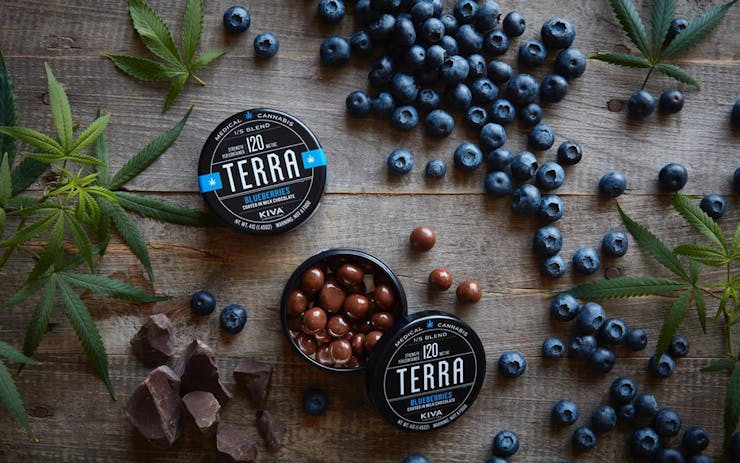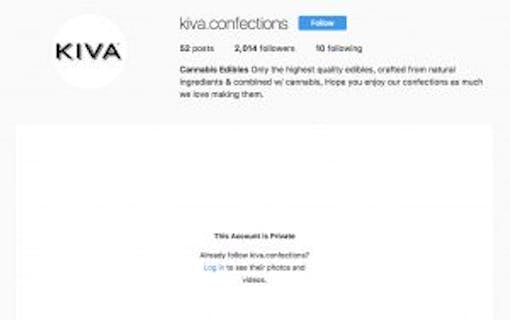Update 8/17/2017, 11:45am PDT: Kiva officials notified Leafly earlier today that Instagram shut down the imposter account on Wednesday, August 16.
On Saturday, online trolls who’d been quietly running a fake Instagram account in the name of the California-based cannabis company Kiva Confections suddenly began abusing people in comments and direct messages.
People were offended by the messages, 'and rightfully so,' said Kiva co-founder Kristi Knoblich.
“At least cancer doesn’t run in my family,” they wrote in one particularly offensive message, directed toward a user with a family member who died of cancer. They followed the note with a smiley face emoji.
These particular imposters were dedicated, setting up the ruse as a kind of sleeper cell. They kept the fake account private and spent months amassing followers. They cribbed copy and high-quality photos from Kiva’s website to make the account look official. As of last Saturday, when the harassment began, the fake account had more than 2,000 followers.
“It was just pretty dark and macabre,” Kiva co-founder Kristi Knoblich told Leafly in a phone interview yesterday. “It makes my blood boil to think about how somebody could, even under the cloak of acting as an imposter to try and hurt us, just be that insensitive to another human being. It just tears you up inside.”
Fighting Back with Video
As the hateful comments and messages piled up, account followers became increasingly offended, and “rightfully so, because it was disgusting,” Knoblich said. It wasn’t long before another Instagram user, who happened to have over 90,000 followers, posted screenshots of the cancer-related taunt to their own page alongside a note condemning Kiva. That opened the floodgates to an onslaught of vitriol directed towards the company—and alerted Kiva officials to the existence of the fake account.
As soon as she found out what was going on, Knoblich posted a video to the company’s Facebook and Twitter pages making it clear that the account was fake. She apologized for the troll’s hurtful comments, and asked users to help get the imposter account removed by reporting the abuse to Instagram. Following the release of the video, a number of people appeared to have unfollowed the imposter account.
As of Tuesday morning, though, the fake Kiva account was still up and running—which is especially ironic considering that Kiva’s actual Instagram account has been shut down by the social media site a total of eight times.
“I don’t have a good understanding of what the algorithms are and what they’re scanning for, so it could be that we’re just constantly getting hit by the same troll reporting our account,” Knoblich told Leafly. “But within a few months or even days of us starting a new page with the name Kiva in it, it’s flagged for removal and taken down.”
Knoblich says Kiva lost nearly 60,000 followers as a result, and that for more than a year they were unable to get more than a one-line email from Instagram saying Kiva had violated the site’s terms of service in response to inquiries about their account.
The Mysterious Rules of Social Media
Strangely, Kiva hasn’t had the same sort of trouble on other social media sites like Twitter or Facebook (which bought Instagram in 2012)—though dozens of other legal cannabis companies have a history of seeing their Facebook accounts banned, too. Facebook’s community standards specifically prohibit content that promotes marijuana sales, even in states where it’s legal.
Many legal cannabis business owners have complained that on both Facebook and Instagram, the rules are vague and seem to be enforced in a patchwork fashion, creating an uneven playing field among competitors in the same industry.
Shop highly rated dispensaries near you
Showing you dispensaries near“What’s so interesting is that you’ll see posts from other companies or users and it’s naked women and paraphernalia and guns and cash,” Knoblich said. “But all the posts we had on our real page were about education. Things like how to keep edibles away from kids, how to store and lock your edibles, pointers and tips for how to use safely. The nature of what we were posting didn’t have anything to do with promoting sales, illegal use, shipping or distribution.”
Instagram Responds, Kind of
After trying for months to get in touch with an Instagram representative, Kiva finally recently received an email that included a more detailed policy around cannabis. The language doesn’t appear to be included in either Instagram’s official community guidelines or terms of service, so it seems the policy hasn’t been made public.
Here is that statement in full:
Instagram does not allow people or organizations to use the platform to advertise or sell marijuana, regardless of the seller’s state or country. This is primarily because most federal laws, including those of the United States, treat marijuana as either an illegal substance or highly regulated good. Our policy prohibits any marijuana seller, including dispensaries, from promoting their business by providing contact information like phone numbers, street addresses, or by using the “contact us” tab in Instagram Business Accounts. We do however allow marijuana advocacy content as long as it is not promoting the sale of the drug. Dispensaries can promote the use and federal legalization of marijuana provided that they do not also promote its sale or provide contact information to their store.
Now that those terms are more clearly laid out, Knoblich is tentatively hopeful that Kiva might eventually be able to get its original account back. She also hopes Instagram might find a way to crack down on imposter accounts like the one that drew ire from the community while posing as Kiva on Saturday.
Instagram’s official policy states that “It’s not currently possible to request or purchase a verified badge,” and that “right now, only some public figures, celebrities and brands have verified badges.” As a result, it’s incredibly easy to create convincing fake accounts—especially when a brand’s real account has been shut down.
“It would be really nice to see some sort of verification feature,” Knoblich says. “I don’t know what the solution is, but there’s got to be a better way than what’s currently happening.”







